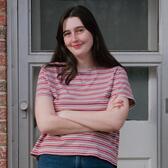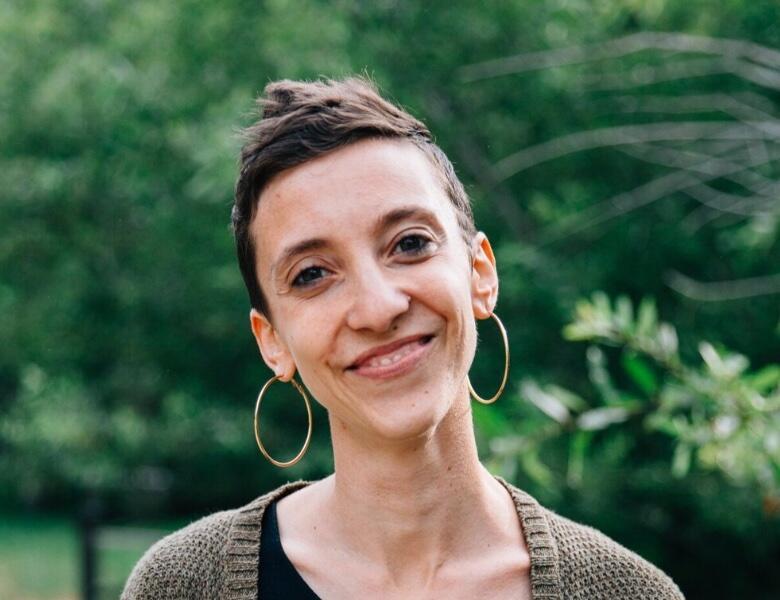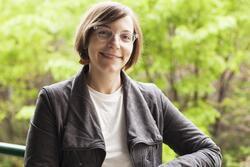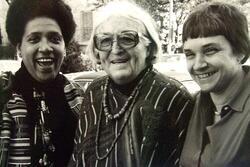Q & A with Poet and Rabbi Mónica Gomery
JWA chats with poet and rabbi Mónica Gomery about her newest poetry collection, Might Kindred.
JWA: Your newest poetry collection, Might Kindred, explores themes of immigration, ancestry, and creating space as a first-generation American—among other things. What were the guiding forces behind this book and how did you conceive of it structurally?
Mónica Gomery: They say that a first book of poetry is an exploration of a poet’s origin stories. Obviously, many don’t fit that mold. Mine certainly didn’t. My first collection, Here is the Night and the Night on the Road, is the story of a loss I experienced, and the subsequent years of grieving and healing. It took a very long time before I was able to write anything not born solely out of this loss, and when I finally did, the seeds for Might Kindred started to appear. I wrote Might Kindred over the course of four years, and it wasn’t always clear to me what unified or connected the poems to one another.
I’ve heard many poets say something to the effect of “the poems are smarter than the writer,” which I agree with. Poems often carry information, intentions, and intelligence that can’t be forced by the will of the writer. Instead, they come from the writer’s surrender to language, and that higher power that sources all creativity. A book happens in that way too, I think. So I tried to let the poems themselves guide me, and trust the book to teach me what it wanted to become.
Might Kindred is a collection of my obsessions: the dead, queer desire, mountains both mythic and real, the conundrum of home, and the search for kindreds, which is complicated when you’re a person raised between countries, cultures, and languages. In the end, it’s this second book that is a collection of my origin stories, though I didn’t know that while I was writing it. The book is driven by a desire for belonging, and a question about the possibility and impossibility of belonging. When the poems are collected together, I think they paint a complicated picture of belonging, which is my truest origin story as a first-generation US citizen, daughter of immigrants, as a White Jewish Latina, and as a Queer femme.
Structurally, I had to learn some hard and invaluable lessons! I originally had the book organized and divided by topical sections—there was a section on queerness, a section on ancestors, a section on living in American cities, etc. I received some crucial feedback from a friend and trusted reader that the poems were in good shape, but the order was terrible. She encouraged me to leave more space for the reader’s intuition. This freed me from needing to rationalize the existence of each poem by placing it into an easily discernible section with an overarching subject theme. Instead, I thought about the arc and emotional journey of the book as a whole, spreading out its recurring motifs in order to build a small world within it, and the music and imagery of the poems as guideposts along the way.
JWA: In the titular poem from this collection, the speaker yearns for “queer poetics.” What does this phrase mean to you, and where do you search for it?
MG: There are as many examples of queer poetics as there are queer poets, and this nourishes me to no end. In an essay on queer poetics, Saeed Jones writes, “queer implies a slipperiness, a subversion of expectations and conventions, an inability to sit still, a refusal to obey.” If we understand queerness as the unconventional, that which is outside of accepted norms, that which is fluid and willing to question, then queer poetics takes all of these associations and enacts them through language. And because queerness is so dynamic, so border-dissolving, we’re never done creating and recreating a queer poetics.
“Might Kindred” is a poem that opens at a poetry reading, in the space between the almost-touching shoulders of two queer poets, new friends seated beside one another in the dark. It’s a poem of longing and desire. Queer desire is almost always sexualized in the media, but there’s so much more that we yearn for—friendship and closeness of all kinds, acceptance, celebration, transformation, safety, solidarity, divinity. I think yearning is a big part of a queer poetics—yearning for the forbidden, yearning for new language and forms, and yearning for a better world. I wanted to write a poem that explored some of these yearnings.
Something else that feels like a part of a queer poetics is the relationship between academic theory and embodied knowledge. When you’re erased or written out of the canon, when your lives are contested and invalidated, you learn as a community to value lived experience as a source of knowledge and truth. Society, institutions, and the powers that be may not recognize us as valid, but what we live and know in our bodies and hearts is real. At the same time, we do have so many brilliant queer theorists who’ve busted their way into formal and informal spaces of learning and have given us so much: Gloria Anzaldúa, Michel Foucault, Adrienne Rich, Eve Sedgwick, José Esteban Muñoz, Audre Lorde… the list goes on, baruch Hashem! The speaker of this poem is yearning for connection, and wondering,“Is this a queer poetics?” If I write it down, if I put that desire on the page, is it the bridge between lived experience and the theoretical work language can do?
JWA: I would love to hear your thoughts on the process of “becoming” a poet. Does it feel like something you have always been, or did you take up the mantle over time (or something in between)?
MG: What comes to mind immediately is Lynda Barry’s work, and especially her book What It Is, which is a graphic memoir and guidebook to opening up one’s creativity. In it, she tells the story of the rocky road she took toward “becoming” an artist. She kept having this enigmatic feeling, this missing thing that she couldn’t put her finger on, but that blocked her creative practice for years, even as she continued to paint, write, and draw cartoons. She searched and searched to try and understand it. Ultimately, she discovered that what was missing was a comfort and fluency with not knowing, which she needed to cultivate. She writes, “To be able to stand not knowing long enough to let something alive take shape.”
This really resonates for me. I’ve always written, ever since I was a child. I’ve always been a person who moves through life and makes sense of it primarily by writing, metabolizing the world through writing. Lots of formative moments along the way have shaped me as a poet: finding teachers and mentors, building interdependent relationships with other poets, submitting my work for years and accruing hundreds of rejections alongside some exciting acceptances, learning to finally enjoy reading my work aloud and sharing it publicly. All of this has been key to becoming a poet. But ultimately I think becoming a poet is really about something more akin to what Barry describes—learning to dwell within the unknown and feeling at home there. Feeling open and available to the mystery of making. Maybe that’s a general truth about becoming an artist, and the poet-specific part is to face that mystery with language, and then stick around over and over again for what happens next.
JWA: You currently serve on the faculty of SVARA, a “traditionally radical Yeshiva” whose mission is “to empower queer and trans people to expand Torah and tradition through the spiritual practice of Talmud study.” Can you describe a moment when you were proud of the physical or spiritual place you created?
MG: The truth is that I can’t think of a moment I’ve experienced at SVARA that hasn’t been a source of deep pride! The rigorous and nerdy, joyful and vibrant, scholarly and celebratory, queer Jewish culture created at SVARA has transformed my heart and my sense of what’s possible. Before the pandemic, we used to gather over the summers for an immersive retreat called Queer Talmud Camp, which was this beautiful ingathering of queer and trans Talmud learners from all over the country, and we would study text all day, and also swim, have talent shows, do skill-shares and workshops, and host a queer elders panel, where all the elders in the community would tell their stories and everyone would sit around listening, crying, expressing gratitude.
Building this kind of intergenerational queer community has been a source of healing and fortitude for me, and playing a role in creating this space is an honor. I remember one summer, a group of young queers from a midwestern city all came together to camp—they were in their early 20s and they’d been running a weekly parsha study group back home. They were so happy to be at camp, with this feeling of finally having found their broader community, their people. During our closing Talmud shiur, one of them dedicated their learning to the rest of the group—it was such an emotional moment—and they said, “We’re going to be OK you guys, we’re going to grow up.” I’ve never forgotten it. I’m so proud of the way SVARA has created a possible future—a loving, supportive, vibrant, creative, radical future—for so many of us who didn’t necessarily know that we had one.
JWA: As both a poet and a rabbi, what does the word congregation mean to you?
MG: The Hebrew for congregation is kahal or kehila, which come from a verbal root that means “to assemble, to gather.” I like thinking of kahal and congregation as verbs, in motion and ever-dynamic, as opposed to nouns frozen in time. To be a community is a verb, something we do and practice, something that’s always in process. We try our best, we make mistakes, we have better days and worse days, we experience conflict and repair, we reach across the divide for one another. We assemble, congregate, sing, sway, we build and co-create, we come together and drift apart…There’s so much movement involved in what it means to be in community or to form a congregation.
JWA: Where do you find commonalities between your work as a rabbi and your work as a poet?
MG: I love this question, and have answered it in different ways over the years. Lately, I’ve wanted to simplify things, and return to the roots of the word rabbi in order to draw connections between these two hats I wear. A rabbi is, at its core, a teacher of Judaism. That’s who the ancient rabbis were, when we started to have a rabbinic tradition. I will be a student of Judaism for my whole life. There’s so much depth and intricacy to this tradition, and I’ll never be done studying it. I will also be a student of poetry for my whole life. I’ll never be done learning, growing, reading, transforming as I read. I sit at the feet of these two very deep and old traditions, and I’ll spend my whole life excavating them; revering them; being in dynamic tension with them; bringing curiosity and humility to them; translating and expanding them. For me, one of the most powerful ways to learn is to teach, and I’m grateful to teach as both a rabbi and poet. My teachers have entrusted me to teach others, and other people have opted in and let me teach them, both of which are a huge gift and responsibility. I love diving deeply into these two echo chambers of language and tradition, by teaching and sharing them with others.
JWA: What’s a line of poetry you find yourself returning to?
I often carry a line or stanza by Alicia Ostriker around with me as a talisman. For about ten years, I’ve held tight to this couplet:
what can I possess
but the history that possesses me
It’s been a perfect touchstone for describing an orientation I have of reaching for the past—personal, familial, and communal histories—in order to anchor me to the present and guide me toward the unknown future. This couplet carried me into and through rabbinical school—it was an epigraph at the top of my application essays back in 2010.
In my more recent poems, I’m trying to weave inherited texts into them in ways that are new for me, and another couplet of Ostriker’s, from the same collection, the volcano sequence, has had a hard grip on me:
sometimes the stories take you and fling you against the wall
sometimes you go right through the wall







